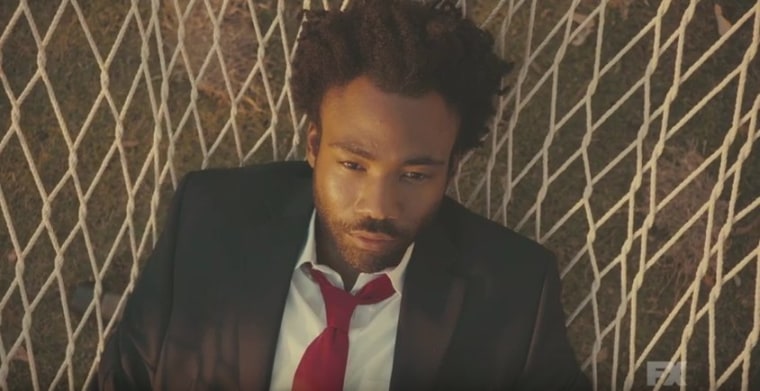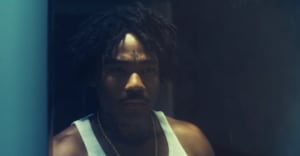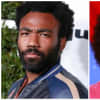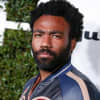 Atlanta FX
Atlanta FX
During each episode of Atlanta, my Tuesday night Twitterverse and IRL friends share their collective excitement about hearing songs from artists like Kodak Black and Cousin Stizz. It’s not just that the show has featured artists that are below-the-radar favorites, or finally getting their deserved shine. It’s that the spot-on, deliberate-yet-nonchalant placement of their songs makes the show feel like it’s made just for you.
For example: Donald Glover's dejected Earn, walking in the rain listening to “Skrt.” Or OJ da Juiceman's “No Hook” soundtracking episode one's overhead tour of the city. The show’s music brings a kind of real-life magic to viewers — a magic that once seemed far-fetched for a cable TV show.
There’s a full creative team behind Atlanta’s success, but two individuals play a pivotal role in curating and facilitating the music each week. Jen Malone is the show’s music supervisor and Fam Udeorji serves as the show’s music consultant. (He’s also Donald Glover’s manager.) Together, the two hone the musical vision of the show and ensure that songs the team believes in make the final cut.
This week, we hopped on the phone with Udeorji and Malone. They explained how a song makes it to a scene and why Atlanta feels so natural.
So how does this awesome music make it onto the show?
FAM UDEORJI: For the most part, it's a collective of people. I think it starts with Donald [Glover]'s own narrative and figuring out the moments where he really wants music. He'll pencil that kind of shit in. And then you have Hiro, you have the editors like Isaac [Hagy] and Kyle [Reiter], who also have suggestions, and they're looking at everything and hitting Donald for suggestions. Then we have that open line of communication. Then it gets to Jen, and she just knocks it out. She knows what she's supposed to do and executes.
JEN MALONE: I definitely really dug into the scene, linking with producers, talking to a lot of these artists themselves in Atlanta, really wanting to make the show sound as authentic as possible. So many of the artists we have in the show are now being signed to majors, which is so cool. They're getting publishing deals, which makes my job a little bit more difficult for licensing.
FU: I think this first season, we were all spread apart, but you still feel like [the show’s sound] is super cohesive. There are certain songs that people were connected to that they shared, and those songs landed on the show. To be real, it's just kind of sharing information, like I said, specifically with Donald. Choices that I feel strongly about. I just really want the show to be good, so if there's something that I feel can help, like a Cousin Stizz appearance, or anything that can help with the taste, that's what I'm going to try to do.
“We just want to hear shit we like, to be honest.”
The show itself has been received so well, but did you guys expect this much positive reception for the music specifically?
FU: I'm kind of shocked that people like it this much! It's weird, because you grow up watching TV a little bit, and there are certain shows you have an affinity for, and now you've made this show that's just as dope.
JM: With Donald being our leader, I think we all knew there was something really special happening, and that the music was just gonna be a huge part of the show.
FU: We just want to hear shit we like, to be honest. Kodak Black and Cousin Stizz made it [on the show]. You know what I'm saying? Those kind of things where you're like, "this will never happen on 'such and such' [TV show]." I wanted those opportunities. This first season, we were trying to open it up. We just wanted to hear shit we like. That's really it. When you put OJ da Juiceman's "No Hook" as the first song, you're really like, "Fuck everybody, this is for us."
The show feels comfortable, like the viewer is hanging with their friends, and all their favorite songs are on in the background. It's pretty wild to hear that stuff on TV.
FU: Absolutely. There are rare moments where you really feel like a fresh perspective is being offered, but your perspective in particular. I think that's specifically what Donald's brother Steve, the primary writer, really offers just because of the people around him. I saw a couple of people mention Chappelle’s Show, and I remember being in high school and loving [the show], and people not understanding that first season. I think it took some time for people to really get into that show. It was one of those things that felt like it was for you, even though you may have been a kid or still in high school, it felt like, "yo, this is more for me, but they're not playing, either." I'm super excited with everybody's response to it.
Was there a particular song that was especially difficult to get locked into the show? Why?
JM: There's a lot of tracking people down, a lot of texts with the artists themselves or management. Also, making sure we have all the rights, dealing with court-appointed lawyers or artists who have been deceased, or in jail.
For the first episode, the scene where Alfred and Darius are driving up to Earn's house, we had a Doe B song in there called "Let Me Find Out," but Doe B was murdered two years ago in Alabama. I had to deal with his court-appointed lawyers who were a little bit reluctant at first. That situation was kind of crazy, dealing with the state, trying to find out exactly who I needed to speak with, who the court-appointed lawyers were, and talking to his mom. it took a long time and it became very personal. First of all, this is the exactly the song that Alfred and Darius would be listening to in the car. It's perfect. So, I wanted to make sure I got it for that reason. I don't ever want to be the person that's going to Donald and being like, "Yeah, we can't get the rights." I just pushed really hard with this and was on the phone a lot with the lawyers. It was important for us to get that one, but it was not easy at all.
Why did you guys decide to start the show with OJ da Juiceman’s “No Hook”?
FU: That's the song, and please credit [writer] Swank, because he is Atlanta. To be honest, Swank is, if you ever met him, the most Atlanta person you could ever meet. And he writes on the show, so that's why I'm excited to even be talking about it. A guy like Swank, a guy like Steve — this is what they listen to. The only reason I know about Young Scooter is because of Steve and Swank. I have very vivid imagery in my head when I listen to "Colombia" — I see a lot of green. That's all they play. I knew about Future only through them from years ago because they would play Future. We would even talk about OJ [da Juiceman]. I remember being with them three years ago when [“No Hook”] came out. Trinidad James played that song for us. It's been around for a long time, and Atlanta was being made three years ago. That was one of those songs where it's so “Atlanta” in terms of people that like it. I think [Swank and Steve] kind of get things a little more, like, it's not the most palatable song, but I think it's also the easiest song to listen to. It just feels right. So a guy like Swank, a guy like Steve, and then Donald just understanding that Atlanta sensibility because he's from there. That's why it's an important part: because it sets the tone off right.
 Atlanta FX
Atlanta FX
Some of my favorite parts have been when a song's playing, and the screen eventually focuses in on a character and they're shown actually listening to the song in their everyday life. Like when Alfred (Paper Boi) and Darius are waiting in the car listening to Cheryl Lynn.
JM: A lot of this stuff was just scripted in, so these are decisions that were made while they were writing the script. A lot of it was very premeditated, if you will. I think [Cheryl Lynn’s “Encore”] was scripted in, so that is what they had in mind. That was something that [Donald] saw and envisioned right from the top. In the opening of the show [Alfred (Paper Boi) and Darius] are listening to Migos, then before they're going to do a drug deal, they’re listening to Cheryl Lynn, like wait, what?
FU: I feel like the music feels hella natural, in an atmospheric way. It's a show about music, but we also kind of see just how people listen to music. We have two friends in the car singing, that feels super natural to me, you know? I think there's a little bit of intention, but it's also setting the world, and what the world is like, and how we live and experience the same kind of world. We listen to music on our headphones, let's see what that feels like.
How do you strike the balance between making sure Atlanta is represented musically while still including music from outside of Atlanta that still feels authentic?
FU: I'll say this: I'm from L.A. I'm from South Central, born and raised. So for me, it's just perspective. When we mentioned OJ da Juiceman, I don't think I would be the source, I think Swank is. Swank and Steve, they're from Atlanta and they represent Atlanta very well, but I can also come from that West Coast perspective and kind of be a blank canvas and go like, "okay, that feels good.” It feels like if I'm not from Atlanta, it feels like an education, and if I'm from Atlanta, it feels like there's some care to this, this feels like growing up. The next couple of episodes, you're going to hear how there's like a maturation of the music a little bit, because of the situations that happen.
JM: It's not wall to wall hip-hop and trap. There's so many unexpected musical moments like having Bill Withers at the end of the second episode. I think people are like, "Whoa, wait. What am I hearing?" It’s another thing that makes the music so special.
Like Cheryl Lynn’s “Encore”
FU: You're going to hear a bunch of songs like that. That’s just the environment of Atlanta. Even growing up, you hear certain things in the atmosphere. There was certain music that you'd feel like your parents listened to, or you’d hear on your walk home, and I think some of those songs feel like that. When you hear throwback songs like Billy Paul, George Benson, [George Clinton and the Parliament] Funkadelic — you're gonna hear that this is what it felt like growing up. So you're going to hear both notes.
I think it's also that everybody understanding it doesn't have to only be Atlanta [music]. There has to be that balance. There's a reason, but there's also subcultures, there's nationality, there's myth, there's a bunch of shit to include. It's not boxing anybody out, really, we're just kind of being open with the world.


